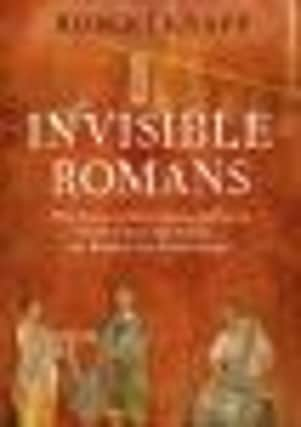Book review: Invisible Romans by Robert Knapp


But what about the empire’s invisible inhabitants, the tradesmen, housewives, priests, prostitutes, slaves, soldiers and gladiators who formed the fabric of everyday life?
Robert Knapp’s extraordinary book seeks out these ordinary men and women and pieces together their lives from tell-tale bits of evidence taken from the mass of Roman history and culture.
Advertisement
Hide AdAdvertisement
Hide AdFrom whores beckoning clients in doorways around the forum and wives fretting about their health to slaves dreaming of freedom and gladiators waiting their turn in the arena, Knapp presents an alternative history more recognisable to us than the heroics and histrionics of the aristocrats.
He finds evidence of the dealings of everyday folk – and even their own words – in literature, letters, inscriptions and graffiti as well as in the nooks and crannies of the histories, treatises, plays and poetry created by members of the empire’s ruling class.
The Roman world was dominated by a tiny, self-perpetuating patrician elite which accounted for less than half a per cent of the empire’s entire population of 50 to 60 million, half of whom died before the age of 20.
Here we learn how the other 99.5 per cent sought to survive and thrive under the afflictions of disease, war, and violence, and to control their fates before powers that variously oppressed and ignored them.
Advertisement
Hide AdAdvertisement
Hide AdSociety had its own complex hierarchy in which the ‘poor’ were lowest in the pecking order. ‘I hate the poor,’ reads a message scrawled on a wall in Pompeii. ‘If anyone wants something for nothing he is a fool.
He should pay for it.’
Life ran on superstition and the most common concerns were death, ill health, robbery, poverty and slavery. Some things never change, however, and many Romans also worried about financial success, debt, unemployment, family matters and marriage.
Theft was commonplace and citizens organised their own vigilante groups. Thieves who made the mistake of being caught were either handed over to a magistrate or, occasionally, lynched by an angry mob.
Most men led active social lives attending public entertainments, religious festivals, local associations, the baths and even public executions which were often preceded by a feast night where guests would gossip, mingle and enjoy free food.
Advertisement
Hide AdAdvertisement
Hide AdBusiness in the many bars and taverns was brisk with food and drink served, and women often available. Dice games were played on the streets, literature was read to passers-by and politics openly discussed.
Women, viewed by men as ‘gossipy, emotionally unstable, fickle, vulnerable and libidinous,’ were expected to devote their lives to children, husband and home and generally there is no evidence to suggest that they secretly balked against their lot.
However, they were far from being shrinking violets, taking charge of their lives in a positive, proactive way, routinely visiting the shops and markets, attending religious ceremonies and even getting stuck into street riots.
Some worked in shops, hairdressers and perfumeries, others were midwives, wet nurses, actresses and bar staff and a small number became involved in land and business ownership.
Advertisement
Hide AdAdvertisement
Hide AdNot surprisingly, gladiators, usually drawn from slaves or free volunteers, had the most colourful and dangerous lives. After signing a contract allowing himself to ‘be burned, chained, beaten or killed,’ a gladiator had a one in ten chance of dying in his first bout.
Gladiators enjoyed public adulation and access to unlimited sexual partners and even though they seldom fought more than three times a year, most did not live past 30.
Prostitution, both legal and morally acceptable in the Roman Empire, was widespread in towns and cities. An estimated one in every 100 people (including men, women and children) in Pompeii was a prostitute and as HIV, syphilis and gonorrhoea did not exist, the trade was not the potential health hazard that it is now.
With the help of illustrations, Knapp’s detailed, scholarly and yet very readable history recreates a world lost from view for two millennia and allows us to see into the minds of the ordinary people who made the empire tick.
Advertisement
Hide AdAdvertisement
Hide AdTheir lives were morally complex, hierarchical, dangerous, sometimes brutal and dominated by fear but what they did and how they did it shaped their world and the world we know today.
(Profile, hardback, £25)